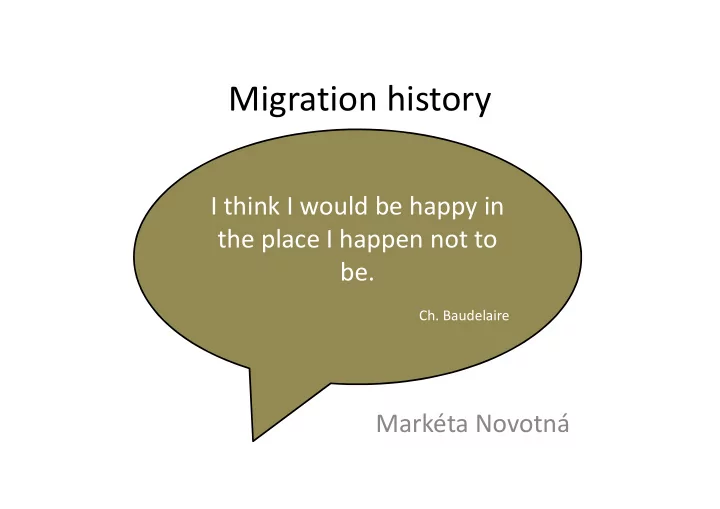

Migration history I think I would be happy in the place I happen not to be. Ch. Baudelaire Markéta Novotná
Migration history • Originally – food, safety, shelter… – Gatherers, hunters => movers – Agriculture – Migration connected to climate • Nowadays – better life, safety… – => now less space, people more flexible – Global vs local (economy, culture…)
Ancient times • Neolithic revolution – From hunters to farmers – *settlements and communities => migrations unusual – mostly if climate change, natural disaster or historical event • 4th-5th century: movements of Germanic tribes (the Huns)
Middle ages • Power and influence from the Mediterranean towards the north of the Alps • 7th century – spread of Islam • 9th-10th century – Vikings (Iceland, Greenland, Russia, America) • 9th century – Magyars/Hungarians • 12th century Mongolian tribes • Migrations mostly limited to land
http://lowres.jantoo.com/history-queen-royal-multiculturalist-multicultural-king-12265826_low.jpg
Modern times • 15th century – better naval techniques and geography knowledge => ´great discoveries´ – Why did people migrate? • Population growth • Gold and silver from colonies => prices rise => poor people migrate • Religious struggles and wars (Huguenots, Puritans…) • Mercantilism – people as economic and military resource – States recruit people actively (often forced migration) • Transatlantic colonies – Sugar plantations… more work force => trade in slaves, triangle system
Triangular Trade http://abolition.e2bn.org/library/0711/0000/0006/1009514mid_360.jpg
Industrial revolution • Large increase in population • People from rural to urban areas (from 1800 to 1900 increase from 30 % to 80 % in England) – less so in Eastern Europe and Russia – Cities cannot absorb all rural migrants • Governments support emigration – solution to unemployment (luddites) • Mass migration from Europe to America • 80 % emigrants from Britain and Germany • Steamships, railroads and cheaper tickets enhance migration (´wild west´) – Once Upon a Time in the West, K. Moberg… • 19th century – 29 million Europeans overseas • Mostly temporary migrants => permanent
USA • 18th century Britain expells to the USA the poor, homeless, convicts (Australia, as well) • WASPs – founders of the US nation? – 1790 – 2/3 US inhabitants spoke English and 99 % were protestant • 19th century – British and Germans, Mexicans • First East cost => to the West – Pursuit of happiness, manifest destiny (Revenant) • Gold in California => Chinese workers (railroads => demonstrations => policy restrictions) • After Civil war new migrants from Europe => nativist movement (x melting pot) – Birth of a Nation • Also: Canada, Australia, Latin America…
WWI and WWII • From voluntary to forced migration – Labor force to Germany and France • Refugee crisis – 1915 ´Armenian genocide´, 1917 October revolution in Russia • Passports • Great depression – less migration, more xenophobia (cheap labor) • Restrictive policies in the USA • WWII – mass forced migration, changed ethnic structures, 40 million displaced persons and refugees • 1947 International Refugee Organization => 1951 UNHCR
Cold war • Forced emigration of Germans from Eastern Europe (Beneš decrees…) • Übersiedler – from East to West Germany (> 3 million) • De-colonization • 1960s-1970s – Gastarbeiter in Western Europe • 1973 – oil crisis => restrictions => migration to Southern Europe • Family reunifications
Post-Cold war era • 1990s – fear of mass migration from Eastern Europe and former Soviet Union – Media + pessimistic predictions => stricter policies – Yugoslavia – refugees – 1 million outside and 2.5 million inside the region – Russia among top immigrant countries worldwide • Terorrist attacks 2001, 2004, 2005, 2015
Nowadays • 2015: over 1 000 000 refugees into the EU – 49 % Syria, 21 % Afghanistan, 9 % Iraq – 17 % women, 25 children under 18 years – 0,02 % of European population • Lebanon (5,8 mil. inhabitants) – 30 % of population are refugees – Jordan, Turkey, Pakistan…
Migrants´ share in population
Questions • Homo sapiens as homo migrans? • How did migration flows change during centuries? – Did only numbers change or also type of migration? • What is the triangular trade? • Why is the industrial revolution perceived as a migration milestone?
Terms to remember • Triangular trade • Melting pot • Passport • UNHCR • Gastarbeiter • Family reunifications
Recommend
More recommend